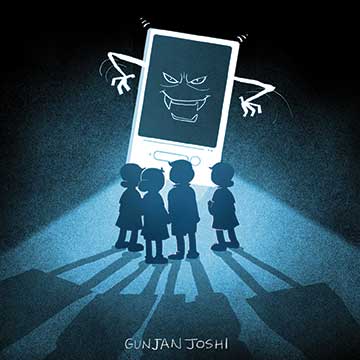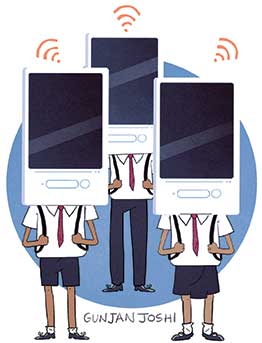Brendan MacCarthaigh
It seems increasingly inescapable that we educators at whatever level must focus deliberately on the reality that our kids are being not just seduced but enslaved by a sinister and demoralizing agency called the smartphone. It is not only our kids, of course, it is a huge swathe of people nationwide: but being school-and-college professionals, it is on students that we must focus our attention.
 I don’t suppose it is necessary for me to spell out the truth of my observation; every adult conversation about youngsters comes back to the same thing: that their world is virtually not just bounded but determined by this brilliant little monster. There is of course much to be said for the smart phone. I would be just writing a school essay to detail all the ways in which it is a help to everyone. But I think that what seems to me to be its sinister influence tends to get glossed over, there is a sort of unwillingness to look at the issue straight on, motivated perhaps by a fear that we would be regarded as exaggerating – or minimizing – its negative impact on the children.
I don’t suppose it is necessary for me to spell out the truth of my observation; every adult conversation about youngsters comes back to the same thing: that their world is virtually not just bounded but determined by this brilliant little monster. There is of course much to be said for the smart phone. I would be just writing a school essay to detail all the ways in which it is a help to everyone. But I think that what seems to me to be its sinister influence tends to get glossed over, there is a sort of unwillingness to look at the issue straight on, motivated perhaps by a fear that we would be regarded as exaggerating – or minimizing – its negative impact on the children.
There is the selfishness that it creates. In any random gathering, most people are talking, not to their neighbours, but into the phone. Children get to realize that this is the way the adult world communicates, and so they follow suit. The other person is not important, only the one in my machine. It is not an instrument that allows you to become exasperated, anguished, thoughtful, reflective, consolatory – these modes need time, silences, body-language. They are interpersonal at the level of body presence. That gets suppressed by the phone system, and finally it disappears from the total vocabulary of communication. This in turn generates a deep and even undefined loneliness.
There is no shortage of substitutes for relationship that this loneliness generates. After all, there are well-paid professionals out there to find ways to push for such seductive substitutes for genuine companionship that the youngster gets drawn irresistibly into distractions of all sorts. There are games, which promote attitudes such as revenge, hatred, punishment, non-forgiveness, falseness. There are games that favour win-at-any-cost, don’t be – oh horror, horror – a loser. There are techniques that make it clear that if you don’t have a body this shape, this colour, this size, then you are inferior. And by corollary, that some are better people than others because they have these dimensions, shapes, abilities, etc. Children don’t digest, they swallow.
I found that almost all teenagers, mostly males, but an increasing number of females, feed on pornography. There is no one to tell them how dangerous this is, how destructive it is, how addictive it is, and in the long run how inwardly debilitating it is. Some indeed may make discouraging noises, but little organized exposition is presented to discourage this addiction adequately. Unbelievably, sex education is forbidden in schools, so this little box is their sole authority, apart from the ravening wolves out there, dressed in sheep’s clothing, who will reinforce what their faithful little mechanical friend has already reassured them is harmless.
On top of all that (and I have summarized) there is the wretched system of education that typifies this country of ours. Almost no academic credentials are guaranteed genuine. Everything can be bought. My friend’s maid with a Class IX certificate could not read nor write her name, nor learn how to light the gas after several demonstrations. College professors use notoriously out-of-date references to get students through exams, the contents of which are, in any case, known to the students beforehand. And then there are the suicides. We are wearily familiar with it all. How can students not be enslaved to their smartphones, in the face of such wretched alternatives? I am certain that you the reader can add another paragraph to the above reinforcing the same theme.
Well then, what do we do about it?
You are reading Teacher Plus. This means you want your professional abilities to go beyond the mere equipping of your students to pass exams. You seek ways to enable them to do, yes, that, but also to grow into confident and responsible and mature citizens of today’s India. That is where this article is placed.
“Knowledge is power”. Your first step is to know the various programmes on the smartphone that children indulge. You don’t have to know them all, but a broad smattering is important.
Next, identify what you as an adult, as a parent, but especially as a teacher, find seductive and enslaving – and plain wrong in the programme. You may already have enough familiarity with the programmes to list these factors – good for you. This is part of your ammunition.
Concurrently with these two steps, chat with some young folk about the programmes, so as to be sure that they too are familiar with the same territory; that you are pretty much on the same page as the children. But at no point indicate that you find the stuff acceptable.
Now you list, preferably in writing for yourself, the precise reasons why you disapprove of their content. At this point you have choices among the following approaches:
- You invite your class to prepare a presentation by them on the progammes you have identified as being unhealthy, without telling the class you do in fact find them unhealthy.
- Then you state your opinion, clear, confident, but without pressure.
- Allow and welcome questions and rebuttals. Keep cool.
- How the class responds to you is really their business – you can’t insist or force, you can only urge, with reasons.
Or
- You give a straight talk to the class under the general head of saving children from smart-phone slavery. Don’t tell them that’s your aim.
- You open your talk by identifying and praising features of smart-phone programmes you admire and enjoy.
- You then itemize the features of the content that you regard as pernicious, backed up by real-life examples to reinforce your argument.
- Rest your case, you have done all you can. How the class responds is, as mentioned above, their business. You have done as much as you can.
 Some young folk will, I have found, realize that they are in fact thoroughly hooked. Especially on pornography. And they are scared, because it takes little thinking on their part to recognize that any sort of addiction, more especially to one’s own body, is humiliating and demeaning. I urge them to take the issue into their prayer, asking their God to help them be strong enough to find freedom. I suggest they talk to some reliable and older and wiser person about the issue if they can, but that even if there is no such person within reach, never to give up trying. Never to despair. I also promise that I too will keep their struggles in my own prayer, and that I am available if further dialogue is needed.
Some young folk will, I have found, realize that they are in fact thoroughly hooked. Especially on pornography. And they are scared, because it takes little thinking on their part to recognize that any sort of addiction, more especially to one’s own body, is humiliating and demeaning. I urge them to take the issue into their prayer, asking their God to help them be strong enough to find freedom. I suggest they talk to some reliable and older and wiser person about the issue if they can, but that even if there is no such person within reach, never to give up trying. Never to despair. I also promise that I too will keep their struggles in my own prayer, and that I am available if further dialogue is needed.
All that having been said, it is important to recognize that the forces of slavery are really very strong, and miracles are rare. The trends in today’s world are powerful and largely destructive and divisive. But good things can and do happen. It is important for you the teacher not to give up hope – or effort, or prayer.
The author is a psychologist and an experienced school, college and university teacher and has specialized in Value Education in Indian schools for very many years. He lives in Kolkata, and can be reached at macbren82@gmail.com.
